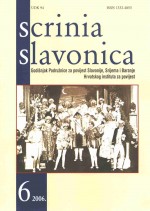Gradivo požeškog arhiva o špijunima u Prvome svjetskom ratu
Požega Archives’ materials on World War I spies
Author(s): Hrvoje ČapoSubject(s): History
Published by: Hrvatski institut za povijest
Keywords: World War I; Austro-Hungarian Monarchy; Croatia; spies; archives; legislation.
Summary/Abstract: The First World War is a topic which still hovers around like an enigma in Croatian historiography. Although more than ninety years have passed since its beginning, many facts have remained undiscovered about the circumstances in Croatia during that War. Reasons may be many. While most international writings on the topic emerged in the 1920s and 1930s, there was no political interest at the time in Croatia to study the War, and the lack of interest persisted through and after the Second World War. One of the reasons must be the lack of archival documents due to insufficient time lag. However, although the Croatian territory was not under direct impact of the greatest battles or destruction, the conflict made itself very much felt, in the form of famine, lack of basic supplies, casualties, men going to battle or the “Green Cadres”. That is why avenues of research have opened to scientists (and still are open) ranging from military history, demography, life behind the frontline etc. Now that the archival documents are available, it has become extremely important to undertake painstaking research to uncover the facts on World War I, in particular on the role of Croatians in the conflict. This paper is based primarily on data obtained from the archival materials of the Požega Archives. Its aim is to show how to obtain information on spies in the legacy of the royal districts (kraljevske kotarske oblasti) as the lowest political unit. After illustrating the administrative structure of the Monarchy, we aimed to show how much importance was attributed to espionage in World War I. Therefore we presented an overview of the laws whose provisions were directly concerned with espionage agencies which later served as the basis for the establishment of the Austro- Hungarian intelligence service. In the concluding paragraphs we explain the methods used by espionage services active in the territory of the Monarchy. Although much more material from diverse archives should be analyzed to properly address the issue, I think that this paper can provide certain guidelines, making some contribution to the assessment of the scope of espionage activities during World War I (especially within the territory of the Monarchy). The data brought to light here could outline, at least approximately and partially, the status of espionage services (primarily the Russian and Austro-Hungarian), the nature of their working methods, or a general profile of the average World War I spy.
Journal: Scrinia Slavonica
- Issue Year: 2006
- Issue No: 6
- Page Range: 267-289
- Page Count: 23
- Language: Croatian

